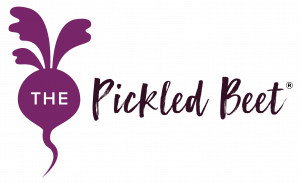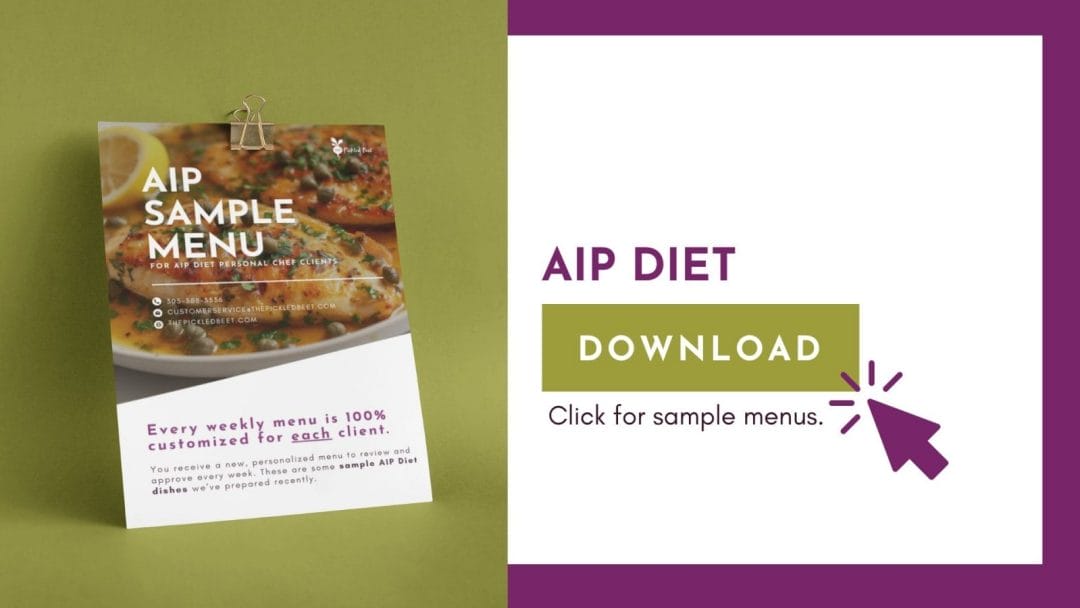Understanding the AIP Diet
What is the AIP Diet?
The AIP diet (autoimmune protocol diet) is designed to help manage inflammation and relieve symptoms for those who suffer from autoimmune conditions, such as multiple sclerosis (MS), rheumatoid arthritis (RA), Hashimoto’s Disease, adrenal fatigue, Crohn’s, lupus, and more.
Autoimmune disease is when a person’s immune system mistakenly attacks its own tissues and healthy cells, leading to unwanted inflammation (the root of disease), and possibly secondary autoimmune conditions. While the causes of autoimmune disease can vary, research shows that certain foods can cause an increased inflammatory response. There are common food culprits, but each person’s body is unique and responds differently.

What Is a Paleo Autoimmune Diet?
The AIP diet, also referred to as the paleo autoimmune diet, is one of many special dietary needs our personal chef team works with.
We frequently get asked if there is a difference between a paleo diet and a paleo autoimmune diet/AIP diet. In short, yes.
The Paleo Autoimmune diet/AIP diet follows the core principles of the paleo diet but the autoimmune protocol diet is stricter.
The paleo diet focuses on whole, unprocessed foods similar to what our hunter-gatherer ancestors might have eaten, including meat, fish, poultry, fruits, vegetables, nuts, and seeds. It eliminates grains, legumes, dairy, refined sugar, and processed foods.
The paleo autoimmune diet focuses on discovering foods that may be triggering inflammation and eliminates additional foods beyond paleo restrictions, such as nightshade vegetables, eggs, certain spices, etc.

The key differences between the two diets are:
- Goals – Paleo targets overall health and well-being, while the AIP diet plan specifically aims to manage inflammation, common in autoimmune conditions.
- Elimination – AIP is more restrictive, eliminating additional food groups that might be problematic for those who suffer from autoimmune issues.
- Structure – Paleo doesn’t have a structured elimination or reintroduction phase, whereas the AIP diet follows a defined elimination period followed by a reintroduction phase to identify a person’s unique food sensitivities.
Autoimmune Disease: By the Numbers
There are over 80 recognized autoimmune disorders.
It’s estimated that up to 50 million Americans have an autoimmune disorder.
One autoimmune disorder makes you 10 times more likely to develop another one.
An estimated 14 million Americans have Hashimoto’s Thyroiditis.
How Does The AIP Diet Work?
The AIP diet helps manage autoimmune disease symptoms by figuring out which foods cause problems for YOU and your unique body. It’s a three-phase process of eliminating foods known for being common inflammation triggers, reintroducing foods one at a time and tracking your body’s reaction, then maintaining a diet that avoids your triggers and incorporates nutrient-dense, anti-inflammatory choices you enjoy.
The Elimination Phase
During the AIP diet plan’s first phase – the elimination phase – you omit certain foods and additives from your diet that are commonly known to cause inflammatory issues. This includes dairy, grains, legumes, nuts, seeds, nightshade vegetables (such as tomatoes, peppers, eggplant, and white potatoes), some spices, processed foods, refined sugar, alcohol, and coffee.
This phase can last from four to six weeks and up to a few months.

The Reintroduction Phase
After the elimination period, the diet progresses to methodically reintroduce foods one by one. This helps identify which foods might be causing specific problems for your unique body.
Maintenance
The maintenance phase of the autoimmune protocol (AIP) diet is all about finding your new normal. It involves continuing to avoid trigger foods while incorporating a variety of nutrient-dense, anti-inflammatory foods into your diet in a sustainable way. This can help to reduce inflammation and manage autoimmune symptoms over the long term.
LET US COOK FOR YOU DURING YOUR AIP DIET JOURNEY
AIP Diet Food List
The AIP diet plan starts with a very specific list of foods to eat and those to avoid, eliminating potentially problematic foods for a period of time and then slowly reintroducing them later in a controlled manner. The reintroduction phase helps pinpoint which foods, if any, cause flare-ups for you.
It’s important to note that there is NO one-size-fits-all answer for everyone with an autoimmune disease. For example, some clients find that they can tolerate nightshades without issue, while others learn that nightshades are a major culprit of inflammation and discomfort.
And while food sensitivity testing can provide clues, the results are largely based on past or frequent exposure to a food, making the results much less reliable than the AIP elimination diet method.
Foods To Eat
Most AIP diet resources will start with a list of foods you cannot eat. At The Pickled Beet, we like to begin, instead, with a list of foods that you CAN eat.
Foods you can eat include:
- Organic vegetables that are not in the nightshade family, such as leafy greens, various squashes, cruciferous veggies, cucumbers, carrots, Brussels sprouts and more (important for vitamins)
- Organic starches such as sweet potatoes, cassava, and green plantains (assists with gut dysbiosis)
- Fresh organic fruits (great source of antioxidants)
- Fresh, wild-caught fish (provides healthy fats and minerals)
- Grass-fed, minimally processed meats (source of linoleic acid, omega 3, and antioxidants)
- Organic, pasture-raised poultry (recommended omega 6 to omega 3 ratio, vitamin A)
- Natural sweeteners in moderation (honey, maple syrup, agave for antioxidant properties)
- Many herbs and spices (such as turmeric, ginger root, garlic, cumin, oregano, sea salt, and black pepper for anti-inflammatory benefits)
- Healthy and minimally processed natural oils (avocado oil, olive oil, coconut oil)
- Fermented foods that are not dairy or nightshade-based, such as sauerkraut, pickles, and kimchi (improves gut health)
What Foods To Avoid
Some of the foods you cannot have during the AIP diet elimination phase include:
- Grains (especially gluten-containing grains)
- Legumes (including beans, peas, lentils, soy, peanuts)
- Nightshade vegetables (such as tomatoes, eggplant, potatoes other than sweet potatoes, and peppers)
- Dairy products
- Processed foods
- Refined sugars and artificial sweeteners
- Eggs
- Nuts and seeds
- Coffee
- Alcohol
- Food additives and dyes
- Spices/herbs derived from seeds or nightshades (such as mustard and chili powders)
- Chocolate
- Any other foods you know you are sensitive to
It can seem like a daunting list at first, we know, but we have seen the relief the autoimmune diet brings to clients. And our Founder Liz Willard, who has Hashimoto’s Thyroiditis herself, has experienced the benefits of the AIP diet firsthand.

“Within Weeks, I Was Feeling More Like My Old Self Again.”
“When I was diagnosed with the autoimmune disorder Hashimoto’s Thyroiditis, I started working with a functional medicine practitioner, and the first thing he did was change my diet. We eliminated gluten, dairy, soy, and a long list of other ingredients … and the result was astounding. Within weeks, I was feeling more like my old self again and had more energy, growing back my hair, and experiencing more restful nights.”
– Liz Willard, Founder/CEO of The Pickled Beet
Common Questions About the AIP Diet Food List
Some common questions we hear related to the list of eliminated foods include:
Are eggs allowed on the autoimmune diet?
Is coffee bad for autoimmune disease?
For some, they find that coffee is, indeed, a trigger …or that only coffee ground in a facility is problematic. For others, it’s everything they put in their coffee (such as creamer) that causes problems, and they learn that they can tolerate moderate amounts of black coffee going forward.
Is oatmeal allowed on the autoimmune diet?
No grains, including oatmeal, are allowed during the elimination phase of the AIP diet.
Do I really have to eliminate alcohol while on the autoimmune diet?
Yes, the autoimmune protocol diet calls for no alcohol consumption during the elimination phase. Alcohol can have a detrimental effect on the body’s immune system, so it’s important to remove it from your diet entirely before the reintroduction testing phase.
“Most Importantly, We Don’t Feel Like We are Missing Out …
“My husband and I needed to begin a pretty strict diet lifestyle. No gluten, dairy, soy, eggs, or shellfish. We were devastated!! We decided to find a customized meal plan in order to survive.
I called several companies, but I wasn’t convinced. This is when I found The Pickled Beet! The moment I spoke to Elizabeth, I knew we found the perfect place for us!! Elizabeth was amazing! She explained everything and was receptive to what I had to say.
Now to the food!! It is delicious, and most importantly, we don’t feel like we are missing out on any of the ingredients we can’t have. We look forward to every meal. They are incredibly healthy and extremely delicious. Elizabeth and The Pickled Beet team have made the transition to this lifestyle very smooth and, most importantly, delicious!!!!”
– Sara R.
How to Craft the Ideal AIP Diet Plan
Living with an autoimmune disease can be overwhelming, frustrating, and painful. Fortunately, the autoimmune diet can help relieve inflammation in the digestive tract, helping you feel much better.

Tips For Success
The most effective way to approach your AIP diet journey is to:
-
Commit fully to the 3 phases
-
Plan ahead
-
Keep “can eat” foods in your home, office, car
-
Plan ahead for holidays and travel
-
-
Find compliant snacks and meals you ENOY
-
Don’t try to do it alone; find resources to help
-
Supportive friends and family or a support group
-
A nutritionist, doctor, or functional medicine doctor
-
An AIP diet chef with deep experience planning menus and cooking meals for clients who need to eat an autoimmune protocol diet
-

Possible Downsides
Without proper nutritional planning and guidance, the AIP diet plan can present a few potential pitfalls:
- Not getting enough fiber
- Not eating enough (“none of my existing recipes or favorite restaurant meals are compliant, so why bother eating”)
- Giving up too soon during the elimination phase
- Avoiding the reintroduction phase for too long and going without needlessly (“I feel so good now that I don’t want to risk adding back any foods”)
LOOKING FOR AN AIP CHEF IN SOUTH FLORIDA?
You are in the right place, and we would love to partner with you on your AIP diet journey. We look forward to talking with you and preparing meals suited to your autoimmune diagnosis, so you can relax, enjoy your food, feel supported, and focus on reclaiming your health.
How The Pickled Beet Can Help You Adopt the AIP Diet
Founded in 2006, our mission at The Pickled Beet is to help you navigate food issues with ease and heal through delicious meals made with organic, premium, clean, whole food ingredients that are created just for you in our gluten-free commercial kitchen in Miami.
We specialize in working with clients who have special dietary needs. Our chef team expertly accommodates even the most severe dietary challenges and protocols, crafting delicious, thoroughly enjoyable gourmet meals and catering services, customized to your unique needs.
Customized, Personal Chef-Prepared AIP Meal Delivery
At The Pickled Beet, we expertly craft personalized gourmet meals, turning even stringent dietary restrictions into culinary delights.
We know it can be daunting trying to figure out what you should (and shouldn’t) eat on an autoimmune diet. Shopping, preparing meals, and eating out all become time-consuming, potentially hazardous, frustrating, and, oftentimes, boring.
That’s where we come in!
First, we get to know you. Each new client fills out a detailed food questionnaire and then we schedule a phone consult to ask questions and learn more.
Next, we create a customized menu each week, with your input, review, and approval, before shopping or ordering groceries.
Then we create your fresh, custom, scratch-made meals, prepared in our gluten-free Miami kitchen according to your specific menu plan and dietary needs.
Finally, we hand-deliver your meals straight to you.

Optional Nutrition Consulting with our RD
Our Nutrition Consulting Service is offered as an add-on exclusively for our weekly personal chef clients and includes:
- An initial hour-long consultation with our Registered Dietician at the onset of your service, to assess your health issues and build a nutrition plan to address them
- Weekly menus created by our RD (she is also a chef) that will be tailored to your specific nutritional and medical challenges
- A monthly meeting with our RD to discuss your progress, make adjustments to your plan, and share information that will help you navigate your dietary challenges
- Access via email to answer questions, provide feedback, and support you in your health journey
Private Catering for Special Diets
Special occasions and dinner parties are incredibly difficult, we know, when you or your guests have food allergies or autoimmune dietary restrictions.
That’s why we also provide catering, private chef experiences, and even private jet catering services that accommodate special dietary needs.
“The Food Has Been Amazing!”
“The Pickled Beet has been cooking for us for about 6+ months, and the food has been amazing! They have been able to accommodate my strict diet, without repeating recipes, and make mealtimes so easy now. I’m happy to have found a professional chef and company like The Pickled Beet!”
– Brooke B.
Frequently Asked Questions
What is the best diet for autoimmune disease?
The anti-infammatory, Mediterranean, and AIP diets all may help fight inflammation. However, the autoimmune protocol (AIP) diet was specifically designed to discover the foods that may cause inflammation and flare-ups in people with autoimmune diseases. Selecting the best diet for you should be part of a personalized plan with your doctor or registered dietitian.
What foods trigger autoimmune flare ups?
Because we don’t know which foods, specifically, trigger a particular person’s autoimmune flare-ups, the AIP diet plan was created to help unearth that information. The phase one food elimination list above includes the most common culprits.
Do autoimmune diets really work?
Diet is one of the few factors (other than sleep, exercise, and managing stress) that those with autoimmune conditions can control. While there are only a limited number of scientific studies on the AIP diet, some have shown positive symptom relief for people with autoimmune diseases who faithfully follow the diet’s phased approach. Our Founder/CEO (who has Hashimoto’s Thyroiditis) and numerous clients we have worked closely with have found significant symptom relief from their diseases by following an autoimmune protocol diet. As with any restrictive diet, we recommend consulting your healthcare professional for a diagnosis and recommended plan, as the AIP diet may not be suitable for everyone.
What conditions may benefit from the AIP diet?
Many autoimmune conditions may benefit from the AIP diet plan, including:
- Hashimoto’s Disease
- Rheumatoid Arthritis
- Celiac Disease
- Adrenal fatigue
- Recurrent viral infections or low immunity
- PolyCystic Ovarian Syndrome (PCOS)
- Multiple Sclerosis
- Sjogren’s
- Type 1 Diabetes
- Lupus (SLE)
- Psoriasis
Do you have a sample autoimmune diet menu your AIP chefs have prepared for a client?
Yes, although please keep in mind that we prepare a new, unique, individualized menu each week for each client, so this is just one sample.
“… better, deeper sleep and don’t feel bloated as much.”
“After going on the AIP diet, I am sleeping much better, deeper sleep, and don’t feel bloated as much. My GI tract is more regular as well. Thank you!”
– Jody P.

